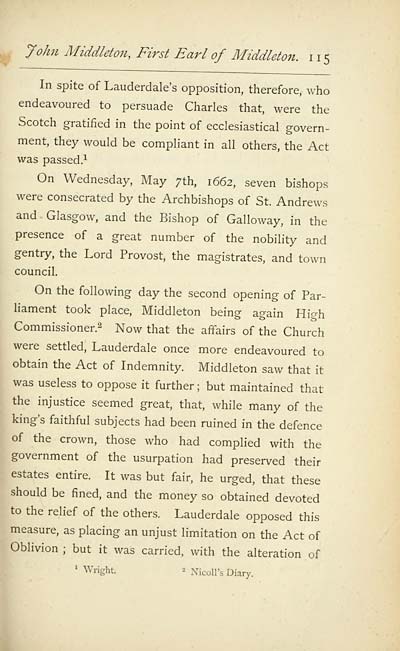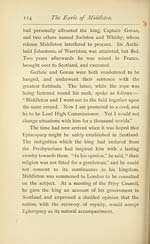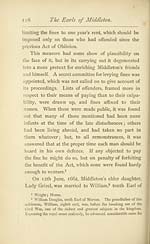Download files
Complete book:
Individual page:
Thumbnail gallery: Grid view | List view

John Middleton, First Earl of Middleton. 1 1 5
In spite of Lauderdale's opposition, therefore, who
endeavoured to persuade Charles that, were the
Scotch gratified in the point of ecclesiastical govern-
ment, they would be compliant in all others, the Act
was passed. 1
On Wednesday, May 7th, 1662, seven bishops
were consecrated by the Archbishops of St. Andrews
and Glasgow, and the Bishop of Galloway, in the
presence of a great number of the nobility and
gentry, the Lord Provost, the magistrates, and town
council.
On the following day the second opening of Par-
liament took place, Middleton being again High
Commissioner. 2 Now that the affairs of the Church
were settled, Lauderdale once more endeavoured to
obtain the Act of Indemnity. Middleton saw that it
was useless to oppose it further ; but maintained that
the injustice seemed great, that, while many of the
king's faithful subjects had been ruined in the defence
of the crown, those who had complied with the
government of the usurpation had preserved their
estates entire. It was but fair, he urged, that these
should be fined, and the money so obtained devoted
to the relief of the others. Lauderdale opposed this
measure, as placing an unjust limitation on the Act of
Oblivion ; but it was carried, with the alteration of
1 Wright. 2 Nicoll's Diary.
In spite of Lauderdale's opposition, therefore, who
endeavoured to persuade Charles that, were the
Scotch gratified in the point of ecclesiastical govern-
ment, they would be compliant in all others, the Act
was passed. 1
On Wednesday, May 7th, 1662, seven bishops
were consecrated by the Archbishops of St. Andrews
and Glasgow, and the Bishop of Galloway, in the
presence of a great number of the nobility and
gentry, the Lord Provost, the magistrates, and town
council.
On the following day the second opening of Par-
liament took place, Middleton being again High
Commissioner. 2 Now that the affairs of the Church
were settled, Lauderdale once more endeavoured to
obtain the Act of Indemnity. Middleton saw that it
was useless to oppose it further ; but maintained that
the injustice seemed great, that, while many of the
king's faithful subjects had been ruined in the defence
of the crown, those who had complied with the
government of the usurpation had preserved their
estates entire. It was but fair, he urged, that these
should be fined, and the money so obtained devoted
to the relief of the others. Lauderdale opposed this
measure, as placing an unjust limitation on the Act of
Oblivion ; but it was carried, with the alteration of
1 Wright. 2 Nicoll's Diary.
Set display mode to:
![]() Universal Viewer |
Universal Viewer | ![]() Mirador |
Large image | Transcription
Mirador |
Large image | Transcription
Images and transcriptions on this page, including medium image downloads, may be used under the Creative Commons Attribution 4.0 International Licence unless otherwise stated. ![]()
| Histories of Scottish families > Earls of Middleton, Lords of Clermont and of Fettercairn > (131) |
|---|
| Permanent URL | https://digital.nls.uk/95312551 |
|---|
| Description | A selection of almost 400 printed items relating to the history of Scottish families, mostly dating from the 19th and early 20th centuries. Includes memoirs, genealogies and clan histories, with a few produced by emigrant families. The earliest family history goes back to AD 916. |
|---|

